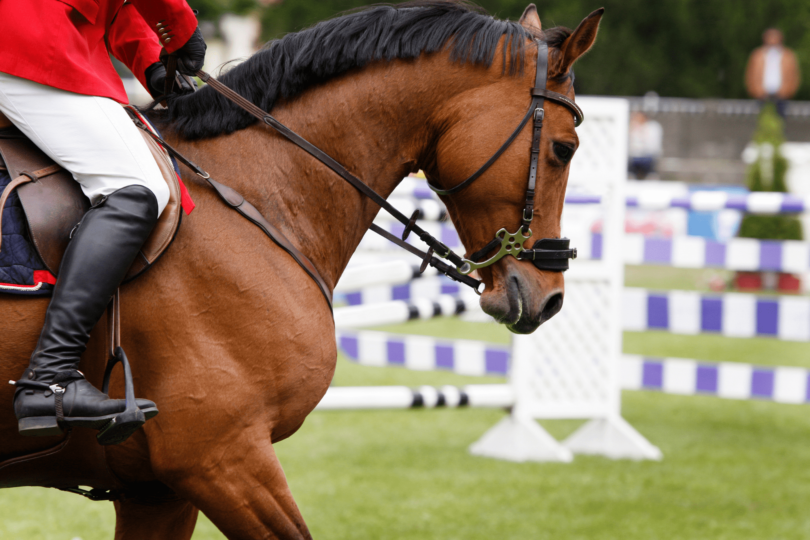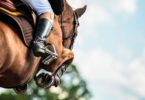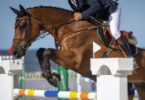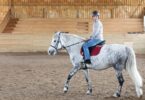Gold Medal Riding at Its Finest
The Olympics showcase the best athletes in the world. The Equestrian events are unique in that men and women compete as equals. The horses are just as much, if not more, athletic than their human counterparts. Olympic equestrian events consist of both individual and team competitions across three events—dressage, eventing, and jumping.
Equestrian sports are the only Olympic events where animals compete as teammates.
History
The Olympic Games originated in ancient Greece thousands of years ago. They were revived in the late 1800’s and have taken place almost every four years since. (Years missed include WWI, WWII, and the 2020 Olympics due to the COVID pandemic.)
Equestrian events are part of the Summer Olympics. They were first added in the 1900 Summer Olympics in Paris, France. Current Olympic disciplines include
In the early 1900’s, equestrian events consisted of polo, Grand Prix jumping, the high jump, and the long jump.
Here’s a highlight reel from the 1948 Olympics in London:
Equestrian events are unique in that women and men compete together—the only other sport in which this happens is sailing. Additionally, equestrian events are the only Olympic events that involve animals. The horses competing at these levels are incredible examples of equine athletes.
Up until 1952, the only people permitted to compete in equestrian events were commissioned military officers and “gentlemen.” After 1952, women and men were allowed to compete in
Today, women and men compete on equal grounds—team events do not require any blends of gender and nations may simply choose the best riders to represent their respective countries.
Olympic Equestrian Events
Dressage
A more qualitative event, judges evaluate horse/rider teams on their ability to complete a pattern evaluating the horse’s flexibility, harmony, and obedience to the rider. Dressage, to the non-horse person, can almost be described as dancing.
- Individual Competition
- Team Competition
- Maximum three riders per country for the
Dressage team
- Maximum three riders per country for the
Here’s Charlotte DuJardin and Valegro at the London 2021 Olympics:
Eventing
15 teams of three horse/rider combinations compete in three days of tests, featuring
- Individual Competition
- Team Competition
- Maximum five riders per country for the Eventing team
Dressage and jumping are covered in the other events; cross country is unique to three-day eventing. A cross country course tests the horse/rider team over a series of jumps in a more natural environment. This event is a test of both endurance and agility.
Here’s a highlight reel from the London 2012 Eventing competition:
Jumping
This event is referred to as show jumping in the USA. Each horse/rider team will jump a series of obstacles in an arena. Obstacles could include parallel rails, triple bars, and water jumps. This event tests the horse’s speed and scope over fences. Penalties, or faults, are incurred based on course time and knocking down jumps or refusals. In this class, a lower score is better. In case of a tie, a jump-off can be used.
- Individual Competition
- Jumping: Team Competition
- Maximum four riders per country on the Jumping team, one of which is a reserve
Check out the 2016 Rio Olympics Jumping Team Finals:
Governing Body
The FEI, Federation Equestre International, was founded in 1921 by delegates of 10 national equestrian organizations, and held authority over the Olympic games from 1924 onwards. FEI governs eight events, three of which are found at the Olympics. These events include:
- Dressage
- Driving
- Endurance
- Eventing
- Jumping
- Para Events (Dressage and Driving)
- Reining
- Vaulting
Notable Equestrian Events
- Polo: Polo was held in 1900, 1908, 1920, and 1936
- Vaulting was held once—in 1920
- Reining is expected to be added as an Olympic event eventually
Get a taste of what equestrian vaulting is all about:
Notable Olympic Riders
- Isabell Werth, Germany, with 6 Gold medals and 4 Silver medals
- Reiner Klimke, Germany, with 6 Gold medals and 2 Bronze medals
- Hans Gnter Winkler, Germany, 5 Gold medals, 1 Silver medal and 1 Bronze medal
- Anky van Grunsven, Netherlands, 3 Gold medals, 5 Silver medals, 1 Bronze medal
- Charles Pahud de Mortanges, Netherlands, 4 Gold medals, 1 Silver medal
Learn more about Isabell Werth:
Notable Olympic Horses
- Charisma, New Zealand eventing horse—Gold medals in 1984 and 1988
- Valegro, British
dressage horse—“Blueberry” Olympic, world, and European championships - Foxhunter, a British showjumper, won the only British Gold medal in the 1952 Olympics
- Sam, a German eventing horse, held Olympic, world, and European titles all at the same time
- Gem Twist, a world-champion US
show jumping horse, won a Silver medal in the 1988 Olympics and was titled “World’s Best Horse” (I remember growing up with a fold-out Horse Illustrated poster of Gem Twist on my wall!)
Watch Charlotte DuJardin and Valegro in the 2016 Rio Olympics:
Rules to Compete in the Olympics
- Riders must be 16 to participate in
dressage ; 18 to participate in eventing and jumping - Horses must be at least 9 (no maximum age)
- Drug rules (for horses) were added in 1972
- All horses must pass a veterinary inspection before and during the Olympic Games
Fun Facts
- Germany has won the most Gold medals in Olympic history for equestrian events, at 25. Sweden is second, at 17, and France is third, at 14.
- The United States has won the most silver medals, at 21. Germany, France, and the Netherlands are all tied with 13 Silver medals each.
- The United States also leads for Bronze medals, with Germany and Sweden tied for 2nd and 3rd.
- 2,067 riders have competed approximately 4,000 times in Olympic competitions since 1912. Most of these riders are one-time competitors.
- 43 riders have competed in five or more Olympics; Ian Miller (Canada) has participated nine times, and Michael Plumb (USA) has participated seven times.
- Britain is the only nation that has taken home a Gold Medal in every Olympics which had equestrian events.
- The oldest woman to compete in equestrian events at the Olympics was Lorna Johnstone, of Britain, at age 70 in 1972.
- The oldest man to win an Olympic medal in an equestrian event was Arthur von Pongracz, of Austria, in 1936. He was 72.
- The oldest person to win an Olympic medal is Oscar Swahn, in shooting—he was also 72 (in 1920).
Closing Thoughts
The equestrian events carry a special significance—they are the only events where animals participate as both athletes and teammates. Additionally, it is one of two events where women and men compete against each other on an even playing field. Governed by the FEI, these events showcase the best of the best from across the globe.
P.S. Enjoy this article? Trot on over to:
- Horse
Show Jumping : A Complete Beginners Guide - Horse Jumping Tips Beginners Can Put Into Practice Today
- 10 Best Stirrups for Jumping Clear (And Staying Safe)
- 100+ Things to Pack for a Jumping Horse Show (Checklist)
- 4-Star Favorites: The 4 Best Cross Country Stirrups
- Horse Riding for Older Adults: Why It’s Never Too Late
- Compositi Stirrups Review: I’ve Never Jumped Better
Sources
https://www.nbcolympics.com/equestrian/
https://www.thesprucepets.com/what-are-the-olympic-equestrian-sports-1886888
https://www.olympic.org/international-equestrian-federation
https://en.wikipedia.org/wiki/Equestrian_at_the_Summer_Olympics
https://sportycious.com/aware-important-facts-equestrian-91572
https://www.topendsports.com/events/summer/oldest-youngest.htm
https://www.topendsports.com/events/summer/medal-tally/rankings-sports-equestrian.htm
https://www.hipicosantafe.com/6-best-show-jumping-horses-time/







